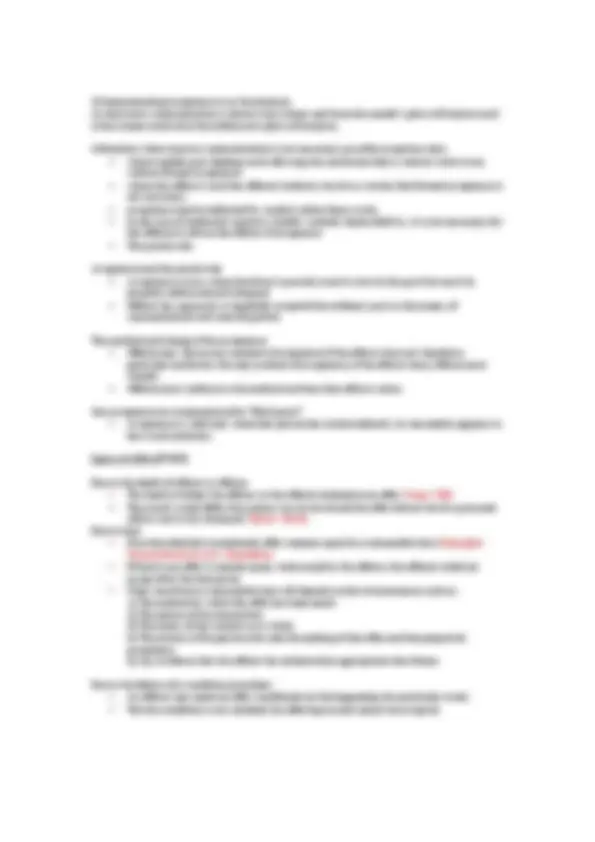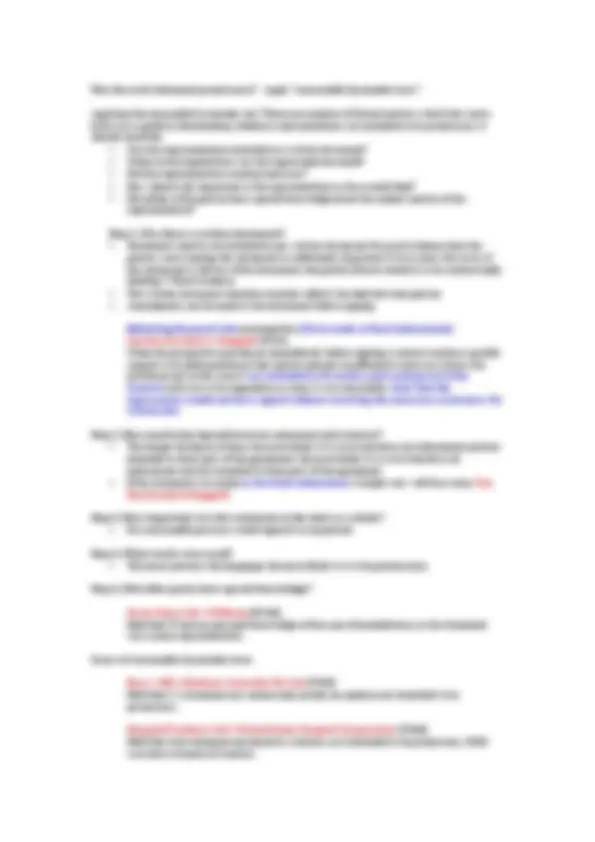Download Contract Law: Offers, Acceptance, and Express Terms and more Summaries Communication in PDF only on Docsity!
Chapter 4 Contract: Offer and acceptance
Introduction (P158) To determine if a contract exists: Step 1: Has an offer been made? [ Offer or Invitation to treat ] Step 2: Has the offer been accepted? [ Only valid when it is properly communicated ] Step 3: Did the parties intend to make a contract? [ Intended to be legally bound ] Step 4: Was consideration provided? [ Both sides must present something of value ] Making the offer Note: A contract can be written or oral. No requirements for it to be in writing! 3 Things to consider: 1.) Offer or merely indication of a present intention? Harris v Nickerson (P 165 ) Not an offer but statement of present intention Standing offer : Colonial ammunition V Reid (P166) 2.) Offer or invitation to treat? (Invitation to negotiate) Partridge v Crittenden (P167) Not an offer but an invitation to treat 3.) Offer or conduct that is merely part of negotiations? Harvey v Facey (P164) Merely supplying factual information as requested. Not an offer Under Invitation to treat:
- Displaying goods with price tag or displayed is an INVITATION TO TREAT not offer Fisher v Bell (P168) Pharmaceutical v Boots Cash Chemists (P168)
- Catalogues are usually is an INVITATION TO TREAT , not an offer Grainger & Sons v Gough (P169) If it were so, the merchant might find himself incolved in any number of contractual obligations to supply wine of a particular description which he would be quite unable to carry out, his stock of wine of that description being necessarily limited.
- Advertisements can be offers Normally are not offer Exception Carbolic Smoke ball : (P170) The deposit of $1000 made it difficult for the company to argue that the advertisement was just a mere advertising puff
- Auctions Auctioneer calling for bids, bidder makes the offer. Can only be retracted until the fall of the auctioneer’s hammer
- Tenderers are the offer makers, not the person calling for tenders Hughes Aircraft Systems International v Airservices (P173) Once submitted a tender, contract existed.
- Internet transaction Listing an item for sale on ebay was an offer. Smythe v Thomas (P174) The fate of the offer (P176)
- Offeror may withdraw the offer
- Offeror may accept the offer = agreement
- Offeror may reject the offer
- Offer may lapse due to passing of time
- Offer may lapse due to death of offer/offeree
- Offer may lapse due to the failure of a conditional precedent Withdrawing the offer (P176)
- An offer cannot be revoked after acceptance, otherwise breach of contract.
- An offer can be revoked before acceptance even if the offeror has promise not to revoke it. (This rule only applies when the offeree give no option to offeror to keep the offer open.) Routledge v Grant (P177)
- Revocation must be communicated to the offeree, otherwise it is ineffective Byrne & Co v Van Tienhoven (P 176 ) Revocation is too slow therefore acceptance is valid, revocation is not effective until it is received by the offeree.
- The communication of revocation does not have to be made by the offeror personally (Must in a reasonably reliable manner) Dickinson v Dodds Communication for revoking an offer could be made by third party to offeree.
- Special problems exist with unilateral offers (Single sided offer like carbolic smoke ball) àCannot be revoked until the other party has reasonably enough time to complete
- Options may not be revoked Routledge v Grant (P179) Grant offered to buy Routledge’s house, G kept the offer open for 6 weeks and withdrew it before expiration. Held that G was entitled to revoke the offer at any time before acceptance. Routledge had given some consideration in return for Grant’s promise to keep the offer open for six weeks
3.Communicating acceptance over the internet. An electronic communication is taken to have been sent from the sender’s place of business and to have been received at the addressee’s place of business. 4.Situation where express communication is not necessary possible exception rules:
- where regular past dealings exist allowing the conclusion that a contract exists even without formal acceptance.
- where the offeror’s and the offeree’s industry involve a custom that formal acceptance is not necessary.
- acceptance maybe indicated by conduct rather than words.
- In the case of unilateral contracts, Carlill v carbolic Smoke Ball Co , it is not necessary for the offeree to advise the offeror of acceptance
- The postal rule. Acceptance and the postal rule
- Acceptance occurs when the letter is posted; even it is lost in the post but must be properly addressed and stamped.
- Offeror has expressly or impliedly accepted the ordinary post as the means of communication between the parties The method and timing of the acceptance
- Offeree may choose any method of acceptance if the offeror does not stipulate a particular method as the only method of acceptance; if the offeror does, offeree must comply.
- Offeree must conform to the method and time that offeror states. Can acceptance be communicated by Third party?
- Acceptance is valid only when that person has actual authority or reasonably appears to have such authority. Lapse of offer (P189) Due to the death of offeror or offeree
- The death of either the offeror or the offeree terminates an offer: Fong v Cilli
- The result would differ if an option was involved and the offer did not involve personal skill or service by deceased: Carter v Hyde Due to time
- If no time limited is mentioned, offer remains open for a reasonable time: Ramsgate Victoria Hotel Co Ltd v Montefiore
- If there is an offer to remain open/ return mail by the offeror, the offeree could not accept after the time given
- What constitutes a reasonable time will depend on the circumstances such as:
- The method by which the offer has been made
- The nature of the transaction
- The terms of the contract as a whole
- The actions of the parties between the making of the offer and the purported acceptance
- Any evidence that the offeror has intimated an appropriate time frame Due to the failure of a condition precedent.
- An offeror may make an offer conditional on the happening of a particular event.
- The the condition is not satisfied, the offer lapses and cannot be accepted.
The agreement must be certain (P191) The courts require certainly as to the parties, the subject matter of the contract and the price otherwise it is void. Whitlock v Brew (P191) Agreement fail for uncertainty. Is an “agreement to agree” binding?
- Unsually an agreement to agree is not binding b/c of uncertainty, unless parties provided a mechanism for fixing price. Hawthorn Football Club v Harding 189 Is an agreement to negotiate binding?
- An agreement to negotaite in good faith was not unenforceable. Probably not binding. Is an agreement made “subject to contract” binding?
- Presumed not to be binding, Master v Cameron
- But “subject to contract” may be displaced by evidence suggesting that the parties did intend to be bound.
- Sale of land is not easy to displace the presumption Other conditional agreements
- “Subject to finance” or “subject to buyer’s approvals” are regarded as condition precedent and there is a contract.
- However the parties have to act honestly and reasonably and thus, the contract will not proceed further
Heads of Agreement / Letters of Intent. Whether parties are intended to be bound will depend on the circumstances of each case Air Great Lakes Pty Ltd v K S Easter ✔ (P208) Document headed “Terms of Agreement”, containing “proposed agreement”, and some oral statements, held that there was a contract. Coal Cliff Collieries v Sijehama ✘ (P 128 ) “Head of Agreement”, document clearly stated not binding, held that no contract. Agreement “subject to contract”. Generally not binding. Masters v Cameron ✘ Masters signed memorandum of agreement “subject to contract”. Held that “subject to contract” is normally presumed not to be a contract as it is normally not a final and unqualified acceptance. Thus, the deposit belonged to Master. Plastyne Products v Gall Engineering ✔ (P209) “Subject to contract”, required to sign, there was a clear intention to contract. “Without prejudice” agreements Gregory v Phillip Morris Ltd ✘ “Without prejudice” was not legally binding in this case. Have the parties provided consideration (P210) Consideration The price you pay to buy the other person’s promise and the concept if ‘price paid’
- Formal contracts
- Deed-‐ an instrument that has been signed, sealed and delivered. Do not require consideration.
- Simple contracts-‐ a contract which is not special and do require consideration to be valid, otherwise no remedy under common law; Simple contracts maybe totally oral, totally written, or partly oral and partly written. What is consideration? It does not have to be in the form of a payment or promise to pay money; it may be a benefit flowing to the promisor, a benefit flowing to a third person at the promisor’s direction, or a detriment to the promise. Examples of consideration.
- A promise to do something. (Consideration has not yet been performed said to be executory.)
- A promise not to do something. (Also called executory.)
- Doing something. (Carlill v Carbolic Smoke Ball Co, Mrs Carlill provided consideration by following the instructions of the advertisement.)
- Refraining from doing something.
- A benefit flowing to the promisor
- A benefit flowing to a third person at the promisor’s direction
- A detriment to the promisee
Consideration must move from the promisee. Dunlop Pneumatic Tyre v Selfridge Dunlop sell tyres to wholesaler who promised its retailers will not sell below price list, retailer Selfridge sold below price. Held that Dunlop has no consideration, it cannot enforce retailer’s promise, only wholesaler, the promisee can. The joint promise rule. If a promise is made to 2 or more persons jointly, only 1 of those persons need provide consideration. The other party who has not provided the consideration can still enforce the promise because consideration is only necessary from one of the joint promises, not from each of them seperately. Coulls v Bagot’s Executor and Trustee Privity of contract. Similar to the rule that consideration must move from the promise. Dunlop Pneumatic v Selfridge Rule of privity of contract applies to when third party are not allow to sue. Exceptions : The rule does not apply to contracts of insurance that benefits a 3 person. Trident General Insurance v McNiece Bros (P214) Held that McNiece was entitled the compensation, although it was not a party to that contract and provided no consideration. Consideration may not be past. Cannot take place before the promisor’s promise. Once the contract is made, it is too late unless fresh consideration is provided Roscorla v Thomas (P215) Purchased a horse, assurance given after the contract of sale completed, Consideration was invalid. Exception to this case For service providers to be hired without any discussion of price until after the service has been provided. Re Casey’s Patents: Stewart v Casey (P216) Held that promise bound as it is treated as positive bargain which fix the amount of reasonable remuneration. Consideration may be of nominal value. Does not have to be equal in value to the promisor’s promise. Thomas v Thomas $1 consideration for rental payment per year. Consideration must be sufficient Consideration does not have to be adequate but it must be sufficient.
Chapter 6 Express Terms
Terms of the contract
- Express terms: Terms expressly agreed by the parties and can be wholly in writing , partly in writing and partly in oral and totally oral
- Exemption clauses: These are a special type of express term designed to restrict liability
- Implied terms by the courts: These are terms which the parties have NOT discussed but which the courts regard as an integral part of the deal
- Implied terms-‐ by statute Three basic tests for establishing the express terms of a contract What are the facts and what did the parties say and do?
- Was anything signed? Signed documents normally binding
- Any signed writing which has been incorporated into the contract?
- Any oral representations the parties intended to be terms? Ascertaining the relevant evidence (P244)
- The parol evidence presumption. Assume the written contract is the completed record , and courts will not permit one of the parties to add or vary that written contract. This presumption is rebuttable , if courts are convinced that the written document is incomplete or incorrect. Statements made after contract formed are not terms A party cannot be bound by statements, promises or representations after the contract been formed unless fresh consideration is provided Thornton v Shoe Lane parking ✘ (P246) Carpark proprietor not protected by exemption clause because the contract was made prior to the ticket being issued. The offer was made by the carpark proprietor and was accepted by Thornton by putting the money in the vending machine. Olley v Marlborough Court Ltd ✘ (P247) The Olleys booked a room at M hotel and paid a week’s board, exclusion clause put on the door after contract made at reception desk, furs were stolen. Held that the clause is not a term. Past dealings may be important in determining the terms because it may be different if Olley’s visited the hotel for a few times as he would have known the existence of the sign. Past dealings can be important in commercial contracts where the parties deal with one another on a regular and consistent basis. The importance of a signed document (1) Person is bound by their signature. A person who signs a document that has a contractual appearance about it is bound by the contents of the document. L’ Estrange v F Graucob Ltd ✔ (P247) Mrs L’Estrange bought cigarette machine, signed a document called a “Sales Agreement” without reading, machine jammed. Held that L legally bound by the contract, L can’t sue.
(2) when is a person not bound by his or her signature?
- The document didn’t appear to be contractual. “ Reasonable person test ”, if no reasonable person would have realised the document they signed was a contract, a person is not bound by his or her signature D J Hill v Walter H Wright (P250) Have past dealings, contract made on phone, machine was damaged, employee signed a form containing exemption clause. Held that contract was made before the clause was presented, although they had past dealings, no one would have treated the form as contract instead of delivery docket. When they signed it, all they were doing was acknowledging delivery.
- Estoppel (P251) Sometimes an oral promise will override a term in a signed document à Unwise to sign document knowing that it is contrary to oral agreement State Rail Authority v Heath ✘ (P251) Agreement not displaced by any oral agreement
- Misrepresentation (Misleading or deceptive conduct)(P252) Where a person has misrepresented the contents of the signed documents, that person will not be able to rely on the contents that have been misrepresented. Be it innocent or not. Curtis v Chemical cleaning ✔ (P252) A false impression has been created which prevented the cleaners from relying on the exclusion clause
- Condition precedent (P253) Signed document will not be binding if the parties have made it subject to a condition precedent. (eg. A will only sell his house if he is sent overseas but if he is not sent he does not have to sell)
- The document does not accurately record the agreement (P253)
- Equitable doctrines (P253) One party unfairly taken advantage of (Chapter 8, eg duress) Incorporating unsigned terms into the contract by notice (P253) Unsigned written statementsàmay be terms of the contract, if (1). Rules of offer and acceptance. (2). Is there reasonable notice? The reasonable notice test: Parker v South Eastern Railway Co ✘ (P25 4 ) Parker left a bag at the railway and bought ticket , unsigned document, lost bag, clause said that company will not be responsible for package over $10. Held that reasonable notice must be given to the other party, If reasonable notice has been given, it doesn’t matter if Parker has read it or not. No reasonable notice given, not bound.
Was the oral statement promissory? -‐ Apply “ reasonable bystander test ”. Applying the reasonable bystander test: There are number of factual matters which the courts look to as a guide in determining whether a representation was intended to be promissory. It should conclude:
- Was the representation included in a written document?
- When in the negotiations was the representation made?
- Did the representation sound promissory?
- How objectively important is the representation to the overall deal?
- Did either of the parties have special knowledge about the subject matter of the representation? Step 1 , Was there a written document?
- Statements need to be included in any written document for good evidence that the parties were treating the statement as sufficiently important to be a term. However, if the statement is left out of the document, the parties did not intend it to be contractually bindingà Parol evidence
- The written document should accurately reflects the deal between parties
- Amendments can be made to the document before signing Rebutting the parol rule presumption: (Term made at final inducement) Van Den Esschert v Chappell (P 2 61) When the prospective purchaser immediately before signing a contract makes a specific request to be informed about that matter and gets an affirmative answer such as the purchaser got in this case it was intended to be made a part and parcel of the contract and was to be regarded as a term. It was reasonably clear that the representee would not have signed without receiving the necessary assurance. No written doc Step 2 , How much time lapsed between statement and contract?
- The longer the lapse of time, the more likely it is to be treated as an inducement and not intended to form part of the agreement, the more likely it is to be treated as an inducement and not intended to form part of the agreement
- If the statement was made as the final inducement , it might very well be a term. Van Den Esschert Chappell Step 3 , How important was the statement to the deal as a whole?
- If a reasonable person would regard it as important Step 4 , What words were used?
- The more precise the language, the more likely it is to be promissory. Step 5 , Did either party have special knowledge? Oscar Chess Ltd v Williams ( P263) Held that W had no personal knowledge of the year of manufacture, so the statement was a mere representation. Cases of reasonable bystander test: Ross v Allis-‐Chalmers Australia Pty Ltd (P263) Held that A’s statement not contractual, merely an opinion, not intended to be promissory. Hospital Produces Ltd v United States Surgical Corporation (P260) Held that oral statement amounted to contract, as it intended to be promissory, USSC won due to breach of contract.
Collateral warranties (P264) When does a collateral contract apply? Step 1 , A collateral warrant must be promissory. ( Reasonable bystander test .) J J Savage and Sons Pty Ltd v Blakney ✘ (P265) Held that representation is not promissory, B based on S’s opinion, not collateral warranty, representation given not a term of contract Step 2 , A collateral warranty must not be inconsistent with the main contract. Collateral contract cannot exist if it conflicts with the main contract. Hoyt’s Pty Ltd v Spencer ✔ (P265) Did not contradict with main contract. Collateral warranty. Maybury v Atlantic Union Oil Co ✘ Held that inconsistent with main contract, no collateral warranty. ** Can be avoided by inserting an appropriate exemption clause àNo collateral warranty. Meaning of a term Once statements are found to be terms, their meaning must be ascertained.
- Reasonable person test. -‐ To determine what the parties mean. AWB (International) v Tradesmen International (P267)
- Parol evidence rule. Hope v RCA Photophone of Australia Pty Ltd (P268) Held that parol evidence rule did not apply to vary its ordinary meaning, no implied term as it would conflict with express term in the document. Exception:
- Clarify ambiguities (patent and latent) in the document.
- Correct errors made in recording the contract. Bacchus March v Joseph Nathan (P269) Interpreting exemption clauses Exemption clauses. – free to restrict, limit or exclude liability. Considering exemption clauses: Step 1 , is the exemption clause a term of contract?
- Post-‐contractual: Exemption clause cannot be incorporated into the contract after the contract has been made. Olley v Marlborough Court Ltd
- A course of past dealings between the parties may be relevant in ascertaining terms in the current contract.
- An exemption clause contained in a signed document will often be binding. L’ Estrange v F Graucob Ltd
Importance of terms (P280) Determined by “reasonable bystander test”.
- Conditions (most important terms) – termination & damages.
- Warranties (less important terms) – damages only.
- Intermediate terms – damages, termination only if breach is very serious. Unenforceable terms (P277) Illegal contracts such as:
- Contracts for an immoral purpose
- Contracts to oust the jurisdiction of the courts
- Contracts tending to promote corruption in public life
- Contracts prejudicial to the safety of the state Unenforceable terms in standard form consumer contracts (P278) Unfair if : à cause a sig. imbalance in the parties’ rights and obligations arising under the contract à not reasonably necessary in order to protect the legitimate interests of the party who would be advantaged by the term Director of consumers v AAPT (P279) The terms were unfair, therefore void under Fair trading Act. Unreasonable restraint of trade (P279) Peters (WA) Ltd v Petersville Ltd (P280) Restraint is unlawful à Unreasonable
Chapter 7 Implied Terms
Implied terms of coorperation and good faith (P290) Implied terms or coorperation à Unless specifically agreed otherwise Rooney v ABB Grain (P343) Implied term to continue to supply daily price information to make the contract affective in a business sense Implied terms of good faith Burger King Corp v Hungry Jack’s (P291) Breached implied obligation of good faith Terms implied into specific types of contracts (P292)
- Contracts b/w professional persons and clients à Implied term to carry out duties with reasonable care and skill à Lawyer, engineer, doctors…
- Contracts for work and materials àContractor use reasonable care in performing the work àService be reasonably fit for the purpose for which it was acquired àMaterials supplied in relation to the work be of good quality and fit for the purpose. Reg Glass v Rivers Locking ✔ (P292) This was a contract for work and materials. Therefore there was an implied term that the door would be ‘reasonably fit to keep would-‐be breakers out of the shop’. The door fitted was not of character, Contract breached Helicopter Sales v Rotor-‐Work ✘ (P293) Normally….. However, in the circumstances of this case, it would not be reasonable to imply such a term as both parties were aware that the defendant had no opportunity to ensure that the parts obtained from Bell’s authorized dealer were free of latent defects.
- Other service contracts àService providers is under an implied obligation to take reasonable care and skill in providing the service and to ensure that the service is reasonably fit for the purpose for which it was acquired. Costa Vraca v Berrigan Weed ✘ (P294) Implied to…. But….. so breached
- Hire contracts àUnder implied obligation to ensure that goods are fit for the purpose for which they are hired
Court held that there is no implied term because the contract didn't have a gap which had to be filled in order to make the contract work. C made a mistake of the completion date.
































